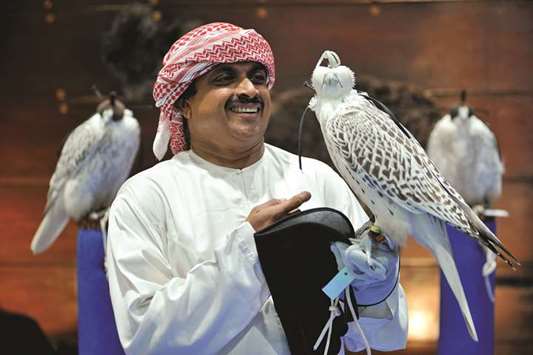Zubair Medammal, who is perhaps the only non-Arab scientist to have a doctoral degree in the study of falcons, feels there are chances that the bird could soon become an endangered species across this region, if not properly protected.
Dr Medammal, who is a faculty member at the southern Indian University of Calicut, was in Qatar recently to attend the T Marmi Festival held at Sabkhat Marmi, in Mesaieed Sealine. He also participated in a major falcon festival held in the first week of the New Year in Casablanca, Morocco.
Falcons, he says, are an integral part of the Arab lifestyle and tradition. Falconry has long been an important sporting activity across the Middle East. “The royal bird is much more than a fascination for me,” he said while issuing a warning about the chances of its extinction in the not-too-distant future.
Arguably the one and only expert on falcons in India, Dr Medammal, who was at the festival in Mesaieed on an invitation from the organisers warned that falcons could soon become an endangered bird owing to issues such as food shortage, accidents and effects of pesticides. “About 35 percent of falcons die after being exposed to pesticides,” he said.
Medammal earned his doctorate from the University of Calicut after a research that lasted more than six years. He carried out his studies in several countries across the Middle East, the North African region and also in Germany. He is the first to prepare a sonogram collecting 15 different sounds of falcons.
The university professor has also received many laurels and presented a paper at an international scientific conference on birds in London a year ago. Dr Medammal also received an invitation to present another paper on ‘Bird Census 2007’ to be held later this year in April in Italy.
He has written a book on falcons that has been translated into Arabic in Qatar and is used as a reference by university students. Dr Medammal also hopes to publish the book in both English and Arabic, with the support of a publisher in Doha. “This is being worked out as I have some falconers from Qatar as my friends. I knew them mainly from our association in the Worldwide Fund for Nature and Natural Resources and Centre for Signs and Scientific Research,” he said.
Arabs, Dr Medammal said, account for one-third of falconers in the world and they import falcons from European countries, especially Germany, which has a suitable climate. Germany is a major breeding centre for falcons and Dr Medammal has received special training in artificial falcon breeding from the German city of Stuttgart.
While spelling out the special features of falcons, Dr Medammal said a falcon lays a maximum of four eggs in a year. “Half of the eggs are destroyed,” he said, while advocating the need for artificial breeding. The birds usually live on top of mountains, towers and other secure places. “When a falcon goes on a hunting flight, its speed reaches about 350km per hour. It cuts the cervical vertebra to kill the prey and eat its liver. Houbara bustard is its favourite food.”
There are 52 species among falcons and the professor’s studies focus on five of them. It is like a national bird in Qatar and most of the Gulf countries, which have falcon hospitals to provide necessary treatment to the king of birds.
The scholar said that an important bond is created between owners and falcons, and the birds are treated with great care and respect. It is believed that Arabs have hunted with falcons for the past 2,000 years.
While calling upon governments and wildlife conservation agencies to adopt effective measures to protect this bird from extinction, Dr Medammal also urged tougher actions to stop the smuggling of falcons, which has become common as its price ranges between QR10,000 and QR1.2 million.
Falconry, or gans in Arabic, is one of the most favourite pastimes among Qataris. Falconry season in the Gulf region starts usually in the beginning of winter, in October, and continues till March. In the past, this sport was practised on foot, on horse or camel backs.
The game used to in abundance in the region, but now hunters have to go long distances or outside the region for hunting. Al-Hur, Al-Shaheen, Al-Wakri and Al-Sinyari are some of the most popular falcon varieties, he said.
Dr Medammal added that only two or three types are used now, Al-Hur, Al-Shaheen and Gyr; and some of the most popular falcon’s game are the curlew, bustards, pigeons, partridges, rabbits and sometimes deer. Gyr, which is well known for its majestic appearance, is the most expensive of falcons.
“It is the only bird that requires a passport to travel from one country to another,” he said referring to the measures taken by some Gulf countries to protect the bird. “This also reflects the importance given by GCC states to falcons,” he added.
The falcon passport, which includes important information about the bird such as its species, nationality, owners name and arrival date, is valid for three years, said the professor.
Qatar launched the system in 2002 to ease frequent movement across boarders for the purposes of falconry.

EXPERT: Dr Zubair Medammal with a falcon.
